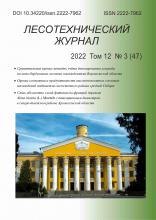Russian Federation
Russian Federation
Russian Federation
Ekaterinburg, Ekaterinburg, Russian Federation
The growth and mycorrhization of the 1-year-old pine seedlings root system were considered when they were grown in a forest nursery after carrying out various agrotechnical measures: sowing pine after green manure and bare fallow, and also introducing forest litter into the soil. The best growth and the root system development were observed in seedlings grown after bare fallow and bare fallow with the introduction of forest litter in conditions of poor soils (low supply of nutrients). Seedlings grown in all variants after bare fallow had the best growth rates than seedlings grown after green manure. Concluded it is recommended to carry out the bioremediation to reduce soil contamination by pesticides using forest litter in fields without the use of green manure. This method can allow not only to increase the linear sizes of pine seedlings, but also to improve the soil quality
Scotch pine, seedlings, nursery, bare fallow, green manure fallow, mycorrhiza
1. Domínguez-Núñez J. A., Berrocal-Lobo M., Albanesi A. S. Ectomycorrhizal Fungi: Role as Biofertilizers in Forestry. Soil Biology. 2019; 55: 67-82. URL: https://doi.org/10.1007/978-3-030-18933-4_4.
2. Menkis A., Vasiliauskas R., Taylor A. F., Stenlid J., Finlay R. Fungal communities in mycorrhizal roots of conifer seedlings in forest nurseries under different cultivation systems, assessed by morphotyping, direct sequencing and mycelial isolation. Mycorrhiza. 2005;16: 33-41. URL: https://link.springer.com/article/10.1007/s00572-005-0011-z. EDN: https://elibrary.ru/OOWOTG
3. Ortega U., Duñabeitia M., Menendez S., Gonzalez-Murua C., Majada J. Effectiveness of mycorrhizal inoculation in the nursery on growth and water relations of Pinus radiata in different water regimes. Tree Physiology. 2004; 24 (1): 65-73. URL: https://doi.org/10.1093/treephys/24.1.65.
4. Wang Y.-H., Dai Y., Kong W.-L., Wu X.-Q. Improvement of Sphaeropsis Shoot Blight Disease Resistance by Applying the Ectomycorrhizal Fungus Hymenochaete sp. Rl and Mycorrhizal Helper Bacterium Bacillus pumilus HR10 to Pinus thunbergii // Phytopathology. 2022. V. 112. № 6: PHYTO09210392R. DOIhttps://doi.org/10.1094/PHYTO-09-21-0392-R. EDN: https://elibrary.ru/RBVVRS
5. Shubin V. I. Mikotrofnost' drevesnyh porod. Znachenie pri razvedenii lesa v taezhnoy zone. Leningrad : Nauka, 1973. 264 s. URL: https://elibrary.ru/item.asp?id=20915089&.
6. Bryndina L. V., Arnaut Yu. I., Alykova O. I. Mikorizoobrazuyuschie griby v formirovanii biogeocenozov: analiticheskiy obzor. Lesotehnicheskiy zhurnal. 2022;1: 4-20. DOI: https://doi.org/10.34220/issn.2222- 7962/2022.1/1. DOI: https://doi.org/10.34220/issn.2222-7962/2022.1/1; EDN: https://elibrary.ru/TNJJDG
7. Freyberg I. A., Stecenko S. K. Vliyanie pesticidov na morfologiyu stvola sosny obyknovennoy na Srednem Urale. Lesovedenie. 2017; 1: 39-44. URL: https://elibrary.ru/item.asp?id=28147874. EDN: https://elibrary.ru/XRYYRJ
8. Kolesnikov B. P., Zubareva R. S., Smolonogov E. P. Lesorastitel'nye usloviya i tipy lesa Sverdlovskoy oblasti: Prakticheskoe rukovodstvo. Sverdlovsk : UNC AN SSSR, 1973. 176 s. URL: https://elibrary.ru/item.asp?id=26177083. EDN: https://elibrary.ru/WAVQYV
9. Novosel'ceva A. I., Smirnov N. A. Spravochnik po lesnym pitomnikam. Moskva : Lesn. prom-st', 1983. 280 s.
10. Andreeva E. M., Stetsenko S. K., Hurshkainen T. V., Terekhov G. G., Kutchin A. V. The mycorrhization of the root system of Scots pine with different granulometric composition of the soil under the influence of bio-stimulants in the Middle Urals. AIP Conference Proceedings 2390, 030003 (2022). URL: https://doi.org/10.1063/5.0069142. EDN: https://elibrary.ru/UUWRVQ
11. Rodin A. R., Rodin S. A., Kalashnikova E. A., Vasil'ev S. B. Lesnye kul'tury. Moskva : MGTU im. N.E. Baumana, 2020. 210 s. ISBN: 978573852651.
12. Aucina A., Rudawska M., Leski T. et al. Growth and mycorrhizal community structure of Pinus sylvestris seedlings following the addition of forest litter algis. Applied and environmental microbiology. 2007; 73 (15): 4867-4873. URL: https://journals.asm.org/doi/10.1128/AEM.00584-07.
13. Rudawska M., Leski T., Gornowicz R. Mycorrhizal status of Pinus sylvestris L. nursery stock in Poland as influenced by nitrogen fertilization. Dendrobiology. 2001; 46: 49-58.
14. Babich N. A. Lesnye kul'tury : ucheb. posobie. 2-e izd., pererab. i dop. Arhangel'sk: Severnyy (Arkticheskiy) federal'nyy universitet, 2010. 166 s. ISBN: 978-5-261-00497-4. URL: https://elibrary.ru/item.asp?id=19514771. EDN: https://elibrary.ru/QLBCBD
15. Gvozdev V. K., Yakimov N. I., Poplavskaya L. F., Seroglazova L. M., Kruk N. K. Intensivnaya tehnologiya vyraschivaniya seyancev hvoynyh porod v lesnyh pitomnikah. Trudy Belorusskogo gosudarstvennogo tehnologicheskogo universiteta. Seriya 1. Lesnoe hozyaystvo. 1999; 7: 64-69. URL: https://elibrary.ru/item.asp?id=41759682. EDN: https://elibrary.ru/ACSPTD
16. Bobrinev V. P., Pak L. N. Effektivnyy sevooborot v lesnyh pitomnikah Vostochnogo Zabaykal'ya. Agrohimiya. 2016; 4: 55-60. URL: https://elibrary.ru/item.asp?id=26017797. EDN: https://elibrary.ru/VXJAQZ












